
"Take My Breath Away" is a song written by Giorgio Moroder and Tom Whitlock for the 1986 film Top Gun, performed by American new wave band Berlin. It won the Academy Award for Best Original Song as well as the Golden Globe Award for Best Original Song in 1986.

Let's Get to It is the fourth studio album by Australian recording artist Kylie Minogue. It was the final studio album with Pete Waterman Limited (PWL), being released by the record label in the United Kingdom on 14 October 1991. Mushroom Records distributed the album in Australia on 25 November 1991. After Matt Aitken left the trio Stock Aitken Waterman (SAW) in early 1991, the remaining producers wanted to make another album with Minogue, although it was not a contractual obligation for her. Mike Stock and Pete Waterman agreed to share their songwriting credits with Minogue for the first time on six tracks. They spent months recording at PWL Studios, more time than any of her previous studio albums.

"Juke Joint Jezebel" is a song by industrial rock group KMFDM from their 1995 album Nihil. It is KMFDM's most widely known song to date, with around three million copies of the song sold across various releases.

Sabrina Debora Salerno, known mononymously as Sabrina, is an Italian singer, songwriter, record producer, model, actress and television presenter.

"Call Me" is a song by the American new wave band Blondie and the theme to the 1980 film American Gigolo. Produced and composed by Italian musician Giorgio Moroder, with lyrics by Blondie singer Debbie Harry, the song appeared in the film and was released in the United States in early 1980 as a single. "Call Me" was No. 1 for six consecutive weeks on the Billboard Hot 100, where it became the band's biggest single and second No. 1. It also hit No. 1 in the UK and Canada, where it became their fourth and second chart-topper, respectively. In the year-end chart of 1980, it was Billboard's No. 1 single and RPM magazine's No. 3 in Canada.

"I Feel Love" is a song by the American singer Donna Summer. Produced and co-written by Giorgio Moroder and Pete Bellotte, it was recorded for Summer's fifth studio album, I Remember Yesterday (1977). The album concept was to have each track evoke a different musical decade; for "I Feel Love", the team aimed to create a futuristic mood, employing a Moog synthesizer.

"All Of Me (Boy Oh Boy)" is a song by Italian singer Sabrina, released in Italy in July 1988 by Metronome as the first single from her second album, Super Sabrina (1988). It was also her fifth international single. Written and produced by Stock Aitken & Waterman, it followed her previous single "Hot Girl" in Europe, while it was her second single release in the United Kingdom, following "Boys (Summertime Love)". Entering the charts in mid-summer 1988, the single became Sabrina's third major European hit. It followed Sabrina's two previous singles into the top ten or top 20 in several European countries, and reached the top 30 of the UK Singles Chart.
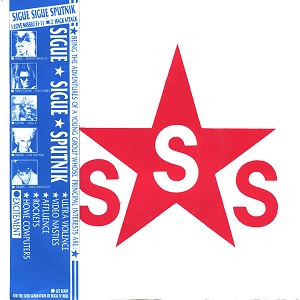
"Love Missile F1-11" is the debut single by the British new wave band Sigue Sigue Sputnik, released in 1986 from their debut studio album Flaunt It. It was the band's biggest hit, reaching number three on the UK Singles Chart. The track was produced by Giorgio Moroder, after Prince rejected a request to oversee production, complaining the track was "too violent." The band approached Moroder due to his work on a number of Hollywood film scores, as well as his early Donna Summer records, with the latter inspiring the band's trademark repetitive, synthetic bass sound.

"Love's About to Change My Heart" is the third single from Another Place and Time, the 1989 album by Donna Summer. The song was released on August 14, 1989 by Atlantic Records and Warner Bros. Records. It was written and produced by British production team Stock Aitken & Waterman. Released as the second single in the US, the song was a hit on the dance charts, but failed to repeat the Top 40 success it enjoyed in Europe.

"Chase" is a 1978 instrumental composition by Italian music producer Giorgio Moroder. It was released as a single during 1978 from his Academy Award-winning soundtrack album Midnight Express (1978), and was a disco instrumental that was subsequently extended and released as a maxi single. It made the Billboard Hot 100 in January 1979, peaking at number 33, and the UK Singles Chart, peaking at number 48.
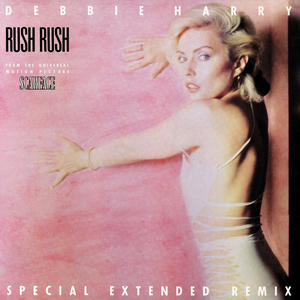
"Rush Rush" is a song written by Giorgio Moroder and performed by American singer Debbie Harry. It was released as the fourth and final single from the soundtrack to the 1983 film Scarface.

"Beat the Clock" is a 1979 song by the American pop and rock duo Sparks. Produced by famed disco producer Giorgio Moroder, it was released as the fourth single from the band's eighth studio album No. 1 in Heaven.
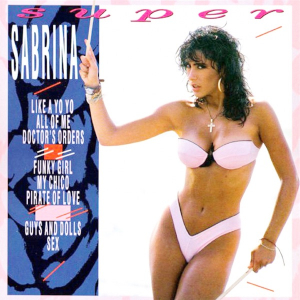
Super Sabrina is the second studio album by Italian pop singer Sabrina, released in 1988 by Videogram.
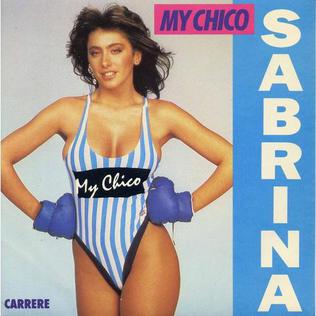
"My Chico" is a song by Italian singer Sabrina. It was written by Sabrina, O.Johnson, Elvio Moratto and produced by Elvio Moratto. The song was released in October 1988 as the album's second single. The song peaked at number two in Italy. The music video for this song was filmed in Florence.

"Gringo" is a song by Italian singer Sabrina. It was produced by Giampiero Menzione. The song was released as a non-album single in July 1989. It was a minor hit in UK, where it peaked at number 95.
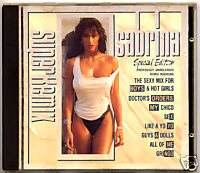
Super Remix is the second remix album by Italian singer Sabrina. It was released in 1990 in Italy only.
"From Here to Eternity" is a song by Italian singer, songwriter, and producer Giorgio Moroder, released in 1977 as a single from an album of the same name.

"Midnight" is a song by British rock band Coldplay for their sixth studio album, Ghost Stories (2014). It was written and produced by band members Guy Berryman, Jonny Buckland, Will Champion and Chris Martin, with production assistance from Paul Epworth, Daniel Green, and Rik Simpson, and co-production from Jon Hopkins, who also received songwriting credits. A music video was released on 25 February 2014 as teaser for the then-unannounced album, while a promotional 7-inch vinyl single was pressed by Parlophone for Record Store Day on 17 April 2014.

"Right Here, Right Now" is a song recorded by Italian producer Giorgio Moroder, featuring the vocals of Kylie Minogue, for Moroder's studio album Déjà Vu. The song had a minor impact on singles chart in Europe and attained the top position of the US Dance Club Songs.

"Life in Tokyo" is a song by the British band Japan. A collaboration with disco producer Giorgio Moroder, who also co-wrote the song with David Sylvian, it marked a change of direction from the band's previous sound. Originally released as a single in 1979, it was reissued twice before it finally became a hit on the UK Singles Chart in 1982.



















